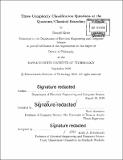Three complexity classification questions at the quantum/classical boundary
Author(s)
Grier, Daniel.
Download1142101782-MIT.pdf (10.03Mb)
Other Contributors
Massachusetts Institute of Technology. Department of Electrical Engineering and Computer Science.
Advisor
Scott Aaronson.
Terms of use
Metadata
Show full item recordAbstract
A central promise of quantum computers is their ability to solve some problems dramatically more efficiently than their classical counterparts. Thus, to understand feasible computation in our physical world, we must turn to quantum rather than classical complexity theory. That said, classical complexity theory has a long and successful history of developing tools and techniques to analyze the power of various computing models. Can we use classical complexity theory to aid our understanding of the quantum world? As it turns out, the answer is yes. There is actually a very fruitful connection between quantum and classical complexity theory, each field informing the other. We will add to this perspective through the lens of classification--attempts to categorize all variations of the object of study as thoroughly and completely as possible. First, we will show that every regular language has quantum query complexity [theta](1), [theta]~([square root]n), or [theta](n). Combining quantum query complexity with these fundamental classical languages not only reveals new structure in these languages, but also leads to a generalization of Grover's famous quantum search algorithm. Second, we will discuss the complexity of computing the permanent over various matrix groups. In particular, this will show that computing the permanent of a unitary matrix is #P-hard. The theorem statement is classical, and yet, the proof is almost entirely the result of exploiting well-known theorems in quantum linear optics. Finally, we give a complete classification of Clifford operations over qubits. Although the Clifford operations are classically simulable, they also exhibit distinct quantum behavior, making them a particularly interesting gate set at the quantum/classical boundary.
Description
Thesis: Ph. D., Massachusetts Institute of Technology, Department of Electrical Engineering and Computer Science, 2019 Cataloged from PDF version of thesis. Includes bibliographical references (pages 177-183).
Date issued
2019Department
Massachusetts Institute of Technology. Department of Electrical Engineering and Computer SciencePublisher
Massachusetts Institute of Technology
Keywords
Electrical Engineering and Computer Science.